Lawmakers Want To Shorten EHR Reporting Period

By Christine Kern, contributing writer

Thirty members of Congress submit a letter to HHS calling for shortened reporting period.
A group of 28 Republicans and two Democrats from Congress have issued a strong recommendation to shorten the 2015 EHR reporting period to 90 days, sending a letter to Health and Human Services Secretary Sylvia Mathews Burwell consolidating their thoughts. The lawmakers join a growing list of those who oppose the current reporting standards, as reported by Health IT Outcomes.
In the letter, the lawmakers argue “the pace and scope of change have outstripped the capacity of our nation’s hospitals and doctors to comply with program requirements,” and they remain “concerned that a full-year reporting period will complicate the forward trajectory of Meaningful Use and jeopardize the $25 billion in federal investment made to date.”
The letter urges HHS to institute a shortened, 90-day EHR reporting period for 2015, “which would give providers much-needed time to safely and effectively implement certified technology and continue their ‘meaningful use’ journey.”
The letter was driven by Congresswoman Renee Ellmers (R-NC) and it reminds HHS that a final rule published by HHS and the Centers for Medicare and Medicaid Services offered flexibility in attesting for Stage 2 during the short period of time remaining in the 2014 calendar and fiscal years, but did not carry that flexibility into 2015.
One of the most vocal groups that have spoken out against the reporting period is the College of Healthcare Information Management Executives (CHIME), who has repeatedly called for changes to existing policies.
Data released by the Centers for Medicaid and Medicare Services (CMS) demonstrated less than 35 percent of the nation's hospitals have met Stage 2 Meaningful Use requirements. And while eligible professionals (EPs) have until the end of February to report their progress, just 4 percent have met Stage 2 requirements thus far.
“Despite policy efforts to mitigate a disastrous program year, today's release of participation data confirms widespread challenges with Stage 2 Meaningful Use,” said CHIME President and CEO Russell P. Branzell, FCHIME, CHCIO.
The legislators’ letter also raises the issue of low attestation numbers, stating, “With such extremely low attestation rates, we are unclear why HHS maintains that healthcare providers, hospitals and physicians alike must perform a full-year EHR reporting period in 2015,” “Our constituents remain concerned that the pace and scope of change have outstripped the capacity of our nation’s hospitals and doctors to comply with program requirements. Unfortunately, the final rule, published by your department in the September 4 Federal Register, disregarded recommendations made by the vast majority of healthcare stakeholders to allow a shortened reporting period in 2015. Instead, your department is requiring a full-year, 365-day reporting period of all providers in 2015.”
